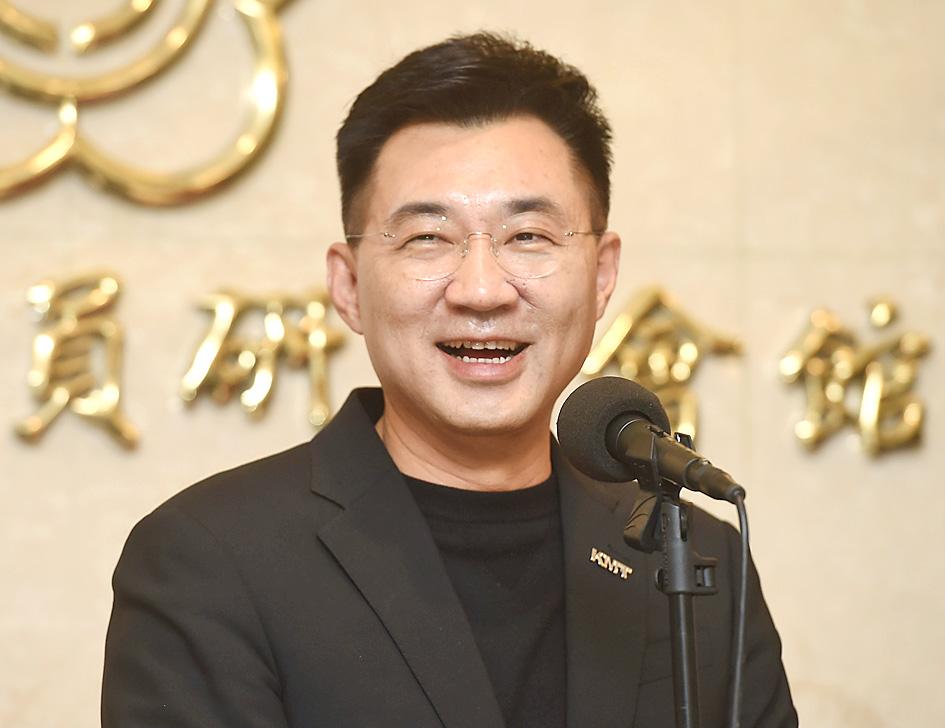Chinese Nationalist Party (KMT) Chairman Johnny Chiang (江啟臣) yesterday announced a bid to retain his post, citing the need for a “kingmaker” to choose the most suitable candidate to win the 2024 presidential election.
As party chairman, with the ability to influence policies, Chiang said that he hoped to represent the party’s younger members and change the public’s perception of the KMT from being a rigidly hierarchical party run by older politicians.
Chiang was clear about not running for president in 2024, saying that he believed the party chair should not entertain thoughts of running for president.

Photo: Chien Jung-fong, Taipei Times
However, people are free to have their own opinion, he added.
Chiang said that he stepped up, choosing to shoulder the responsibility of leading the party when it was at its lowest after last year’s presidential election, fully aware that he would face criticism for promoting change.
Over the past year, the KMT has weathered numerous issues — including the recall of former Kaohsiung mayor Han Kuo-yu (韓國瑜), re-elections for Kaohsiung mayor and city council speaker, recall motions for independent Kaohsiung city councilor Huang Chieh (黃捷) and former Democratic Progressive Party Taoyuan city councilor Wang Hao-yu (王浩宇), and protests over the importation of US pork with traces of ractopamine — but they have made the party stronger, Chiang said.
Wang was recalled as Taoyuan city councilor, while Huang remains a Kaohsiung city councilor.
The party’s long history does not mean it should be old and decrepit — it must rather change with the times, as it has done many times in the past, Chiang said, citing the reforms introduced by then-president Chiang Ching-kuo (蔣經國) in 1986.
The party must change from within as it is challenged from without, and areas such as its cross-strait policy, its policy to foster younger members, and improvements to party finances and organization all need to change, Johnny Chiang said.
The party must acclimatize itself to being in the opposition and be closer to the people, as well as familiarizing itself with technology, he added.
Younger members need to have a say in KMT policies, as the younger generation is the future of the party, he said, citing his being featured on Time magazine’s second annual “TIME100 Next” list — which recognizes “emerging leaders who are shaping the future” — as a way of encouraging younger members to step to the fore.
The KMT chairperson election is to take place in July.
Johnny Chiang defeated former Taipei mayor Hau Lung-bin (郝龍斌) in the party’s chairperson by-election on March 7 last year. The election filled the vacancy left by Wu Den-yih (吳敦義), who stepped down after the party’s losses in last year’s presidential and legislative elections.
Additional reporting by Chen Yun

Taiwan has received more than US$70 million in royalties as of the end of last year from developing the F-16V jet as countries worldwide purchase or upgrade to this popular model, government and military officials said on Saturday. Taiwan funded the development of the F-16V jet and ended up the sole investor as other countries withdrew from the program. Now the F-16V is increasingly popular and countries must pay Taiwan a percentage in royalties when they purchase new F-16V aircraft or upgrade older F-16 models. The next five years are expected to be the peak for these royalties, with Taiwan potentially earning

STAY IN YOUR LANE: As the US and Israel attack Iran, the ministry has warned China not to overstep by including Taiwanese citizens in its evacuation orders The Ministry of Foreign Affairs (MOFA) yesterday rebuked a statement by China’s embassy in Israel that it would evacuate Taiwanese holders of Chinese travel documents from Israel amid the latter’s escalating conflict with Iran. Tensions have risen across the Middle East in the wake of US and Israeli airstrikes on Iran beginning Saturday. China subsequently issued an evacuation notice for its citizens. In a news release, the Chinese embassy in Israel said holders of “Taiwan compatriot permits (台胞證)” issued to Taiwanese nationals by Chinese authorities for travel to China — could register for evacuation to Egypt. In Taipei, the ministry yesterday said Taiwan

Taiwan is awaiting official notification from the US regarding the status of the Agreement on Reciprocal Trade (ART) after the US Supreme Court ruled US President Donald Trump's global tariffs unconstitutional. Speaking to reporters before a legislative hearing today, Premier Cho Jung-tai (卓榮泰) said that Taiwan's negotiation team remains focused on ensuring that the bilateral trade deal remains intact despite the legal challenge to Trump's tariff policy. "The US has pledged to notify its trade partners once the subsequent administrative and legal processes are finalized, and that certainly includes Taiwan," Cho said when asked about opposition parties’ doubts that the ART was

If China chose to invade Taiwan tomorrow, it would only have to sever three undersea fiber-optic cable clusters to cause a data blackout, Jason Hsu (許毓仁), a senior fellow at the Hudson Institute and former Chinese Nationalist Party (KMT) legislator, told a US security panel yesterday. In a Taiwan contingency, cable disruption would be one of the earliest preinvasion actions and the signal that escalation had begun, he said, adding that Taiwan’s current cable repair capabilities are insufficient. The US-China Economic and Security Review Commission (USCC) yesterday held a hearing on US-China Competition Under the Sea, with Hsu speaking on